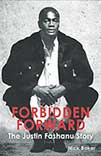 The Justin Fashanu story
The Justin Fashanu story
by Nick Baker
Reid Publishing, £14.99
Reviewed by Paul Buller
From WSC 326 April 2014
How much is there left to say about a man of whom so much has already been said? This biography of Justin Fashanu will certainly not be the last. The sleeve notes of Nick Baker’s Forbidden Forward promise more detail than ever before and to identify “those who are to blame for his untimely death”.
That salacious hook thankfully fails to live up to its promise and is a distraction from what is a comprehensive insight into Fashanu’s life, from birth through to the moment he took his own life aged just 37, with intimate contributions from those acquainted with him along almost every step of the way.
Described as “a hero to some, a conman to others and an enigma to most”, Fashanu’s story is that of a young black footballer’s struggle to make it in his career and life, with the added burden of coming to terms with being a gay man in two unforgiving environments – professional football and evangelical Christianity.
This could be the story of many a young player: catapulted to stardom as a teen, treated brutally by a new manager (Brian Clough), terrible with money but fond of the high life. But it’s the mix of circumstances that make Fashanu’s tale so engaging. He was a striker of supreme ability with a penchant for on-field violence; an intelligent, gentle, well-spoken young man off the pitch who was both introvert and extrovert, aloof and needy, avaricious and generous.
It’s a shame then that what should be a fairly fluid tale jars at regular intervals. The story of his early idyllic life in sleepy rural Norfolk, where Fashanu grew up boxing and playing endless football, is brought to a screeching halt by clunky metaphors and segues: “While other kids his age were down the arcade or hanging out on street corners smoking, Fashanu was perfecting his punch and smoking opponents” is but one of many that get in the way.
The author feels the need to remind us too often that life will not always be as rosy as the early years: portents of the doom are waiting at every opportunity, mostly at the end of chapters in what feels like an unnecessary plea for us to keep reading.
Baker also occasionally offers his opinion on Fashanu’s state of mind and the treatment he received as a black and openly gay man but it’s more pub psychology than insight. When we’re treated to a graphic description of how the book’s subject took his own life we’re told, twice, what he was thinking as he he did it. Fashanu was alone at the time, left only a simple note and told no one of his intentions, yet the author writes as if he was there.
In the end, no one is blamed for Fashanu’s death, but don’t take that as a spoiler. Beyond the publisher’s hype and some slack editing, the book gives an insight into a tumultuous life that remains as intriguing now as it did when Justin Fashanu was alive.